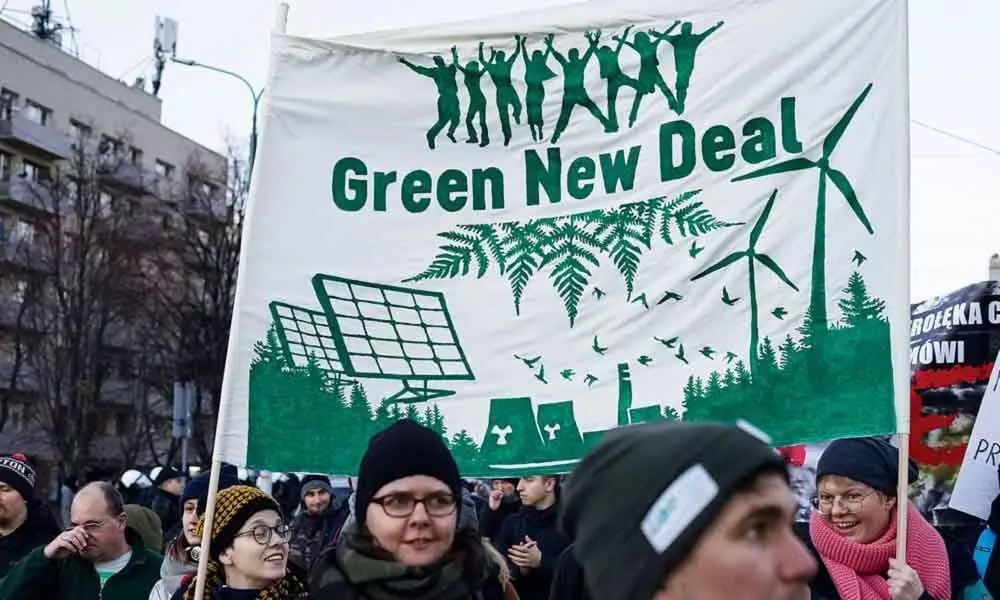Live
- ITC HOTELS’ OPEN WELCOM HOTEL JABALPUR IN MADHYA PRADESH
- Hyundai IONIQ 5 takes part in GUINNESS WORLD RECORDS™ title for the Greatest altitude change by an electric car
- Xiaomi Pad 7 India Launch on January 10: Expected Price, Specifications, Features, and More
- Muzigal launches its State-of-the-art Music Academy in Miyapur, Hyderabad.
- AP Weather Alert: Meteorological Department Issues Rain Warning for Next 2 Days
- Toyota Kirloskar Motor Unveils “Happier Paths Together” – A Corporate Campaign Championing Happiness for All
- Promoting Sports and Athletes is Telangana Government’s Priority – MLA Rajesh Reddy
- CM Revanth Reddy Urges Tollywood to Collaborate on Social Issues
- Karnataka BJP Protests Congress Over Alleged Misuse Of Public Funds
- Thousands Pay Tribute to Lance Havaldar Anoop Poojary in Udupi
Just In
New Delhi: Climate fight got boost in 2019 with act now call


The chorus against climate change got louder than ever in 2019, and the government took a slew of measures to mitigate its impact such as launching a national clean air programme, providing financial aid to states to save forests and Himalayan glaciers besides envisaging a national coastal mission to protect India's shorelines.
New Delhi (PTI): The chorus against climate change got louder than ever in 2019, and the government took a slew of measures to mitigate its impact such as launching a national clean air programme, providing financial aid to states to save forests and Himalayan glaciers besides envisaging a national coastal mission to protect India's shorelines.
India also led from the front at prominent global conferences under the United Nations convention in 2019 and hosted one such meet on land desertification, a major contributor to climate change, where Prime Minister Narendra Modi raised the land restoration target from 21 million hectares to 26 million hectares to be achieved by 2030.
The year 2019 also saw not just environmentalists being critical of the government, but school children hitting the streets urging the authorities to be serious about saving the planet from climate change. From signing and circulating petitions to holding placards in protest across the country, children did it all to shake the conscience of the authorities to declare climate change a national emergency and expedite the process of reducing carbon emissions. From 16-year-old Swedish girl Greta Thunberg to eight-year-old Licypriya Kangujam from north-east India, the passion to fight climate change united even the children, who took the global stage to urge leaders around the world to "act now".
At the UNCCD COP14, held in Delhi-NCR in September, over 190 countries participated and adopted a declaration which aims to consider land-based solutions for climate action and bio-diversity to achieve long-term goals of Paris Agreement. A few days later at the UN Climate Action Summit in New York, Modi gave a clarion call for a "global people's movement" to bring about behavioral change to deal with climate change as he made a path-breaking pledge to more than double India's non-fossil fuel target to 450 gigawatts.
The year ended with the most significant conference of parties on climate change - the United Nations Framework Convention on Climate Change COP 25 - held in Madrid from December 2-14, where Union Environment Minister Prakash Javadekar said India was "walking the talk" on climate goals under the Paris Agreement, but urged developed nations to fulfill their commitment of providing USD100 billion per year to developing countries for climate resilience. India also ranked among the top 10 in this year's Climate Change Performance Index (CCPI), presented at the COP 25 summit, but despite an overall high rating for its performance, the report also pointed out that the Indian government was yet to develop a roadmap to phase out fossil fuel subsidies that would consequently reduce the country's high dependence on coal.
Under the Paris Agreement, India had pledged to reduce emissions intensity of GDP by 30-35 per cent by 2030 and create additional carbon sink of 2.5-3 billion tonnes of carbon dioxide equivalent through additional forest cover by 2030. On the domestic level, the government released nearly Rs 50,000 crore to states for compensatory afforestation and other green activities, including prevention of forest fires, biodiversity management and soil conservation.
The year also saw pollution levels spiking and rise in sea level with several reports coming out as warnings for the country to brace for the climate change impact. Intergovernmental Panel on Climate Change (IPCC), a UN body, came out with a special report on oceans where it cautioned that due to rise in sea level, India's coastline may get severely affected. According to the report, India's financial capital Mumbai, one of the largest and most densely populated cities in the world, is at risk of being submerged by 2050.
It also warned that Andaman and Nicobar islands might not be inhabitable in future due to increase in climatic events like cyclones.

© 2024 Hyderabad Media House Limited/The Hans India. All rights reserved. Powered by hocalwire.com






